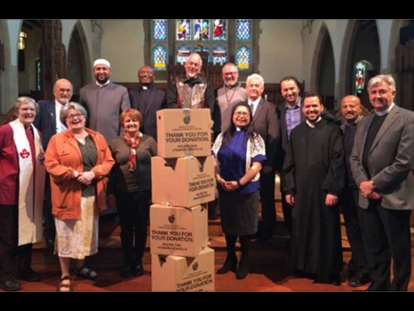
Dec
Tackling stereotypes head on: Interview with the author of Love in a Headscarf
Written by Staff WriterShelina Zahra Janmohamed is a leading commentator on British Islam, a columnist for EMEL magazine, a regular contributor to the Guardian and the BBC and the author of the Brass Crescent Award-winning blog, Spirit 21. Named one of the UK's hundred most influential Muslim women by the Times of London, Ms. Janmohamed has authored her first book, Love in a Headscarf.
Recounting her decade long journey to find her husband, the Oxford-educated author provides a humorous take on her experience of growing up a Muslim woman in England, including an amusing account of the process of marriage proposals and countless mismatches. The Muslim Link interviewed the woman fondly known in Britain as the “Muslim Bridget Jones.
How would you describe your book in 50 words or less?
A humorous, irreverent and romantic memoir of growing up as a Muslim woman looking to find herself, her faith and love.
Has the reaction to your book been as you expected?
The reaction has been very warm and welcoming ”“ especially from Muslim women who have said “Finally! A book that expresses my experiences!” My aim in writing the book was not to be critical or cause any distress ”“ but rather to take a warm, compassionate and humorous view of the challenges that face Asians and Muslims in reconciling tradition, religion and modernity. I hope I'm a voice from within all those arenas, that can see the positives, but also point out where things don't always live up to the high expectations we have. As I wrote the book I realised more and more that all the characters that I describe as well as the institutions were going on a journey just as I was. The open secret is that I'm not the only one who has had these experiences ”“ almost all the young men and women I know, as well as the hundreds who've written to me have been going through the same scenarios. Amazingly, I was the first to write about it!
What surprise reactions, if any, have you encountered in response to the book?
The most surprising responses have been from the right-wing press who often perpetuate so much negativity about Muslims ”“ they have loved the book, and taken very warmly to it. I was also taken aback by the tremendous reception Love in a Headscarf received in India ”“ reaching number 2 on the best seller list.
What prompted you to take the leap from keeping a blog to writing a book?
After I started writing my blog four years ago ”“ a mixture of humour, honesty and East-West insight ”“ I was constantly asked to write a book about being a Muslim woman. I resisted for a long time because I made the mistake that so many people make ”“ I thought that unless I was a movie star or a politician then I couldn't write a book! I remember walking into my local bookstore one day and being faced with a whole shelf with a special display of books with words like "oppressed" "sold" or "kidnapped" in the titles. The tales were topped off with accounts of rejection of Islam and the nirvana of "liberation" from it. Both of these archetypal stories featured book covers almost exclusively of women with sad oppressed eyes staring out from behind a tightly wrapped niqab, camels and deserts in the background.
It is hard to tell whether publishers illustrate their books in this way because it reaps easy commercial rewards. Or is it that they themselves cannot see the complexity and variation amongst Muslim women. I was fed up of seeing the same old stories told all the time, and wanted to share one "from the inside", and in a way that itself was groundbreaking.
I realised that none of the books on the shelf represented my story, and that if I wanted my story to be told, then I would have to tell it. So I chose to write a humorous and light-hearted tale. I wanted to tell a story that touches each of us as human beings, looking at questions of love, life and meaning that we all share, but through the eyes of a Muslim woman. Most of all, I wanted to explore the contradictions and contrasts that we all face, and humour was the best medium for that. As Peter Ustinov said, "Comedy is simply a funny way of being serious."
The biggest challenge I faced was when I took the book to a number of publishers whose commissioning editors loved the story, but couldn't see it fitting with the existing mould of books about Muslim women. "We need an 'alias' of a book that is already out there so people understand how it relates to previous books," they explained, meaning it should be either a forced marriage story or one of escape from Islam.
With such black and white views about the stories that Muslim women are permitted to tell, how can it ever be possible to create an understanding of our diversity and complexity?
In choosing to write within the “chick-lit” genre, were there any concerns that the book might be dismissed as “trivial”?
My book has been described as a ”˜Muslim Bridget Jones,' and I have mixed feelings about this. On the one hand, Bridget Jones really captured a zeitgeist and spoke to something very intimate in many modern women. To be compared to something that is now an entrenched part of popular culture is a great compliment. On the other hand, Love in a Headscarf has many deeper elements about asserting your identity, finding your place in the world, and standing for what you believe in. That these have become secondary is difficult, I admit, but overall the book has had such great success and been so widely published and read that the genre I've chosen has served the story very well.
Did you learn anything from writing Love in a Headscarf; what was it?
Since the book was published, my experience of being married has lengthened and deepened, and I see the importance of being constantly giving in order for love to grow, and I have learnt to appreciate how even the smallest of actions from your partner or those around you can point to the deeper love that exists in the relationship. It helps you to appreciate how powerful love can be in smoothing through the difficulties of life.
I also gained an insight into the individuals who populated my life, and I felt more compassionate towards them ”“ even reflecting on the journeys that they had been on in their own lives.
Finally, I learnt that changing negative perceptions is hard work ”“ but with patience, effort and humour you can make it happen.
How optimistic are you that Muslim voices will take ownership of their own stories and share them with each other and the wider society?
Very optimistic. I'm seeing more and more literature by Muslim writers that depict the enormous diversity of the Muslim community. I think the trick is for writers to be honest and simply tell good stories. And the next step will be for such writing to be classed as “good writing”, which is what much of it is, instead of being boxed into the category of “Muslim writing.” I feel that time is coming.
Do you have any advice for other Muslim writers?
The more voices and stories that we can get into the public domain I think the better it is for everyone's understanding of what it's like to be a Muslim. And I hope that my humorous approach will be part of a change of tone and subject when it comes to Muslims ”“ that we're not just anonymous creatures, but have real stories, sadness and comedy, and real desire to engage with the world.
This article was produced exclusively for Muslim Link and should not be copied without prior permission from the site. For permission, please write to info@muslimlink.ca.












